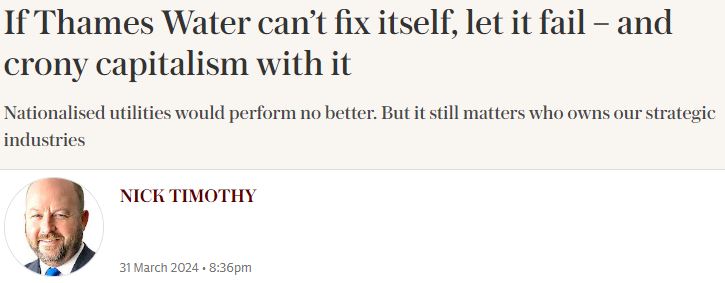Today's discussion about the news
Comments
-
Are you only looking for illegality?
What I'm puzzled by is why the new owners bought a basket case. The old owners seem to have bled it dry, then managed to find some suckers to pay money for the corpse.
0 -
-
Thanks Rick, that looks like what we need. Will take a look.
"I spent most of my money on birds, booze and fast cars: the rest of it I just squandered." [George Best]0 -
-
It's in a mess then. Looks like something Macquarie would put together.
0 -
Bottom line is the Thames is filthy, so much so boat race rowers are getting ill from it, and the shareholders won’t stump up the money to pay for investment and the debt they themselves thrust onto the company unless the govt lets them charge 50% more.
Given billions have gone out in dividend, it seems a a bit rich.
0 -
I did post this earlier but it is clearly leftie bollox from a newspaper not worthy of comment.
The above may be fact, or fiction, I may be serious, I may be jesting.
I am not sure. You have no chance.Veronese68 wrote:PB is the most sensible person on here.0 -
How are you separating the two? It is not in the interests of the shareholders to shaft the company - 'the goose that lays the golden egg' etc.
"I spent most of my money on birds, booze and fast cars: the rest of it I just squandered." [George Best]0 -
Current performance begs to differ right?
I don’t think loading the firm up with debt has helped anyone other than coughing up dividend and it is now hamstringing the company for further investment.
0 -
Looks like the regulated entity has a big pile of debt, some external (but more from intra-group loans from the group financing company which is a also a subsidiary of the regulated company).
The other point is that looking at the Companies House filings, it is clear that the debt financing costs have ramped up significantly in the last few years for the 3 companies in the securitisation ring-fenced group. Looks like what i said earlier - failure to allow for changes in interest rates and put that sub-group into a loss making position.
"I spent most of my money on birds, booze and fast cars: the rest of it I just squandered." [George Best]0 -
Not looking for illegality. That wouldn't be shown on a group structure anyway. It's important to understand where the debt is and who has rights to what.
What you describe is classic Macquarie. I don't get why people fall for it, but they do.
0 -
The overall return for investors is made up from on-going dividends plus value on exit. First, the dividend flow is going to be hit by the losses as it reduces the retained earnings that are needed to pay dividends and second, the price that any willing investor is prepared to pay will be reduced by the losses and the debt itself.
"I spent most of my money on birds, booze and fast cars: the rest of it I just squandered." [George Best]0 -
No one is putting more equity into a company with too much debt unless the lenders agree to restructure (or there is some government money).
I imagine everyone is waiting for one party to default, so the process of unwinding the structure can begin. Someone will have first ranking security.
0 -
The reported stand off is with the investors and the regulators - investor won’t stump up the necessary equity unless ofwat allows them to increase the price to customers by 56%
0 -
Meanwhile in a different world, Scottish Water element of my council tax, is how it's done in these parts, has increased by 2.2% this year cf last year.
0 -
I guess they are playing the 'Too big/important to fail' gambit. It should be the investors not the bill-payers who pay the price, as the bill-payers had no choice.
0 -
Obviously on a much smaller scale, but I have seen a few building contractors go under because one or more shareholders opted for short-term gain over long term viability of the business. The idea that shareholders act always in their own best interests seems a unlikely. It would make them unusual human beings.
1985 Mercian King of Mercia - work in progress (Hah! Who am I kidding?)
Pinnacle Monzonite
Part of the anti-growth coalition0 -
They probably thought that they were acting in their best interests but got it wrong.
"I spent most of my money on birds, booze and fast cars: the rest of it I just squandered." [George Best]0 -
-
According to this thread the high profits were rooted in the regulator setting the amount of investment too low due to over-estimating interest rates. Borrowing was cheaper than anticipated and there was no requirement to invest more in infrastructure so they didn't. Now borrowing for the regulator-required level of investment is much more expensive than can be afforded without increasing bills dramatically. I can't see nationalisation solving any of that.
1985 Mercian King of Mercia - work in progress (Hah! Who am I kidding?)
Pinnacle Monzonite
Part of the anti-growth coalition0 -
I'm surprised that as a regulated industry there is no specified level of investment or at least a specified level of performance (such as not having too many instances of dumping raw sewage in waterways).
That said, capital investment does not always hurt profit directly as the costs are capitalised rather than expensed and only the depreciation then hits the P&L. A good chunk of the sort of assets they will need to invest are long life, so have low depreciation rates and so the P&L hit is spread over many years (the audited accounts state depreciation for each asset class and a lot of it is well over 100 years (over 200 years for sewers and reservoirs).
Agree, I can't see how nationalisation will solve anything here.
"I spent most of my money on birds, booze and fast cars: the rest of it I just squandered." [George Best]0 -
From that thread I understand that the regulator worked out what they could afford to invest based on (over)estimated interest rates and keeping bills low, and set that as the amount of required investment (presumably as an absolute figure rather than a proportion). Interest rates were then much lower for a prolonged period so the required level of investment cost less leaving more profit. That explains why there is not much to be done now other than suck up the higher bills and think more carefully about how such things are regulated in the future.
1985 Mercian King of Mercia - work in progress (Hah! Who am I kidding?)
Pinnacle Monzonite
Part of the anti-growth coalition0 -
But why should Jo and Joe Public be forced into 56% cost hikes when the basic infrastructure 'provider' is a monopoly with no possible alternatives. Did they all support Thatcher era privatisation with questionable regulator oversight, 35 years ago so...?
0 -
This is the bit I don't get. Utter mismanagement (even if we discount the possibility of someone making a killing out of it all) and false promises (to repeat myself, the bill hikes in the early days of privatisation were predicated on upgrading the infrastructure - supposedly), but bill payers and tax payers are expected to bail 'em out now when it all goes pear shaped. Just why? It appears to be a 'heads we win, tails you lose' scenario from the privatised water industry perspective.
0 -
I don't think anybody is saying that (regardless of whether anyone supported privatisation in the late 80's).
"I spent most of my money on birds, booze and fast cars: the rest of it I just squandered." [George Best]0 -
I must admit that I read the Telegraph for the big stories.
0 -
TBF it is currant affairs.
7 -
Who else do you think should pay?
1985 Mercian King of Mercia - work in progress (Hah! Who am I kidding?)
Pinnacle Monzonite
Part of the anti-growth coalition0 -
The NT have not used butter in their scones for years. Someone at the DT is obviously a very sore loser that the sh*tstirrers at Restore Trust failed yet again.
1985 Mercian King of Mercia - work in progress (Hah! Who am I kidding?)
Pinnacle Monzonite
Part of the anti-growth coalition0 -
It does seem to be a case of privatise the profits and socialise the loses.
Nationalisation clearly isn't going to solve the current issue. But the current system of privatisation hasn't worked well in this case at all.
0












